|
|
|
Sort Order |
|
|
|
Items / Page
|
|
|
|
|
|
|
| Srl | Item |
| 1 |
ID:
122012
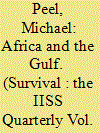

|
|
|
|
|
| Publication |
2013.
|
| Summary/Abstract |
Gulf states and sub-Saharan African countries have begun to forge closer economic ties over the past few years. This process, amid financial crisis in the West and strong growth in Africa, provides a platform for an important new inter-regional geopolitical power play.
|
|
|
|
|
|
|
|
|
|
|
|
|
|
|
|
| 2 |
ID:
074912
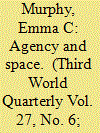

|
|
|
|
|
| Publication |
2006.
|
| Summary/Abstract |
Recent political reforms in the Gulf Arab countries have been variously understood as regime survival strategies, correlates of economic globalisation, and even the end result of US pressure to democratise. This paper examines the possible role played by the introduction of modern information and communication technologies (icts) in stimulating political liberalisation in the Gulf Arab states. Rather than attempting to quantify their democratising impact, this paper utilises the concept of agency, examining how the range of agents of ict production and diffusion in the region have sought to influence the actual impact upon political space. It concludes that modern icts have demonstrated the potential to expand the existing public sphere, and to create new opportunities for liberal political activity. However, the particular configuration of agency in the countries in question has meant that the state and its allies have retained a significant degree of control over the extent and nature of the political space, a process in which local society may have in some instances collaborated. Thus, while the introduction and diffusion of new icts may have contributed to the pressures which led to some of the political reforms in evidence in the Gulf Arab states, one cannot argue that they amount, at least as yet, to a sustained and effective attack on illiberal political structures. The first part of this paper surveys the existing body of literature in an effort to devise a framework for the subsequent study of two principal contemporary icts (satellite television and the internet) in the Gulf Arab states.
|
|
|
|
|
|
|
|
|
|
|
|
|
|
|
|
| 3 |
ID:
181872
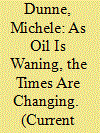

|
|
|
|
|
| Summary/Abstract |
With the future of fossil fuels looking bleak, resource-dependent regional powers are competing for other means of securing their positions. While some are striking new alliances—even with Israel— they are also redoubling efforts to stamp out democratic voices at home and abroad.
|
|
|
|
|
|
|
|
|
|
|
|
|
|
|
|
| 4 |
ID:
053808
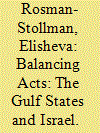

|
|
|
| 5 |
ID:
102605
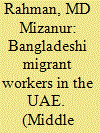

|
|
|
|
|
| Publication |
2011.
|
| Summary/Abstract |
This article examines the migration experiences of women and men under conditions of temporary migration. It has been amply shown that gender is relevant to most aspects of migration. However, despite the fundamental increase in research on gender and migration, a transnational space, where gender matters but which has not bee so thoroughly explored to date, is the experiences of women and men migrants in the migration process, especially under conditions of labour migration in the Gulf States. Focusing on Bangladeshi male and female migrant workers in the UAE, this research sheds light on gender-differentiated patterns of demographic profiles, recruitment and pre-departure costs, working and living experiences, wages, savings, and remittances, health care and leisure activities and reports substantial variation in migration experiences across gender lines.
|
|
|
|
|
|
|
|
|
|
|
|
|
|
|
|
| 6 |
ID:
127325
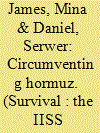

|
|
|
|
|
| Publication |
2014.
|
| Summary/Abstract |
After 34 years, the Carter Doctrine remains valid. But there are cheaper and more effective ways of keeping the oil flowing than unilateral deployment of military force.
|
|
|
|
|
|
|
|
|
|
|
|
|
|
|
|
| 7 |
ID:
144103


|
|
|
|
|
| Summary/Abstract |
In May 2015, the last border outpost between Syria and Iraq still controlled by the regime of President Bashar al-Assad fell to the mujahideen of the Islamic State.1 The Islamic State, also known as ISIS or ISIL, has long intended to erase what it claims are artificial boundaries, and to topple the ill-conceived states that mar the Arab world. It is not alone in that aim. From the Kurdish Democratic Union Party in Syria and Kurdistan Regional Government in Iraq, to the secessionist al-Hirak in southern Yemen and the Cyrenaican separatists in Libya, political actors across the region are mounting claims to states of their own. For the second time in a century, the map of the Arab world is on the brink of radical revision.
|
|
|
|
|
|
|
|
|
|
|
|
|
|
|
|
| 8 |
ID:
080819
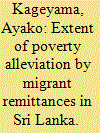

|
|
|
|
|
| Publication |
2008.
|
| Summary/Abstract |
After reviewing some of the available empirical literature on current trends of remittances and their economic impact on welfare of migrating countries, this study focuses on the case of Sri Lanka to demonstrate that workers' remittances may have both positive and negative consequences in home communities. Economically, remittances will benefit migrant households, particularly poorer ones, by increased income in the short term. However, they may sometimes cause negative social effects, particularly through disruption in family relations and also by creating a sense of relative deprivation in non-migrant communities. Therefore, migration and remittances are not the sole solution of poverty alleviation and appropriate policies also need to address unexpected adverse effects
|
|
|
|
|
|
|
|
|
|
|
|
|
|
|
|
| 9 |
ID:
190360
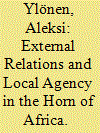

|
|
|
|
|
| Summary/Abstract |
Strategic and security analysis of the Horn of Africa systematically portrays the roots of instability as external. However, the region’s stability or instability is largely determined by local actors and conditions. Local agency and context largely set the conditions for the involvement of external actors. This article discusses how state and nonstate actors have conducted their engagement with outside powers, especially the Gulf states, at a time of increasing rivalry for influence in the Horn of Africa, with examples ranging from Ethiopia to Somalia, and from Djibouti to Somaliland.
|
|
|
|
|
|
|
|
|
|
|
|
|
|
|
|
| 10 |
ID:
181870
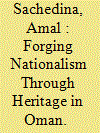

|
|
|
|
|
| Summary/Abstract |
During his five-decade reign, Sultan Qaboos bin Said relied on heritage as a key tool for nation-building. Old forts and objects central to Omani traditional culture like the coffee urn and the ceremonial dagger became symbols of a unifying national ethos. At the same time, their former political significance was downplayed. But some Omanis have held onto memories of a different conception of the past. And now, after the sultan’s death in 2020, heritage is becoming more of a privatized business sector.
|
|
|
|
|
|
|
|
|
|
|
|
|
|
|
|
| 11 |
ID:
031102
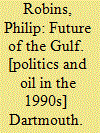

|
|
|
|
|
| Publication |
Dartmouth, Royal Institute of international Affairs, 1989.
|
| Description |
xvii, 145p.
|
| Standard Number |
1855210118
|
|
|
|
|
|
|
|
|
|
|
|
Copies: C:1/I:0,R:0,Q:0
Circulation
| Accession# | Call# | Current Location | Status | Policy | Location |
| 031607 | 338.272820956/ROB 031607 | Main | On Shelf | General | |
|
|
|
|
| 12 |
ID:
189689
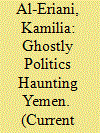

|
|
|
|
|
| Summary/Abstract |
Yemen’s perpetual security crisis and excess violence have long been blamed on a weak or failed state. Who needs this narrative, and to what end? This article explains how outside powers and local elites for decades have contrived to keep the Yemeni state feeble or absent. These “ghostly politics” have provided impunity for repression and fomented power struggles, culminating in the war that has ravaged the country for seven years. Now an internationally backed peace plan envisions fragmenting the state even further.
|
|
|
|
|
|
|
|
|
|
|
|
|
|
|
|
| 13 |
ID:
156849
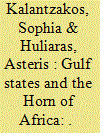

|
|
|
| 14 |
ID:
165218
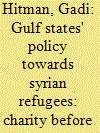

|
|
|
|
|
| Summary/Abstract |
The regional turmoil in the Middle East since December 2010 has provided researchers with many topics for research. Despite a relatively large number of studies in recent years, none of them deal with one of the central questions – namely, the attitude of the Gulf States toward the misery of the Syrian refugees. While more than six million Syrians fled their homeland and became refugees, 1.5 million in Europe, few, if any, succeeded in relocating to the Gulf States.
|
|
|
|
|
|
|
|
|
|
|
|
|
|
|
|
| 15 |
ID:
179808


|
|
|
|
|
| Summary/Abstract |
All Arab states, including the Gulf states, are regularly considered an anomaly in International Relations: allegedly artificially created, lacking clear identity, borders and sovereignty. We challenge this assertion by looking at one dimension of sovereignty often overlooked: the air space. We measure this assertion along the classical lines of sovereignty: do the states have the institutions, regulations and capacity to manage their air space, do they use it for economic and diplomatic purposes, do they have the means to conduct war in it, and does it feature in their national identity? We find that particularly since 1990, the Gulf States have affirmed their sovereignty markedly in all these areas. These findings show two things: that sovereignty can be a feature of a state regardless of the nature of its creation, and that it can be affirmed in a space previously overlooked, the air.
|
|
|
|
|
|
|
|
|
|
|
|
|
|
|
|
| 16 |
ID:
132470
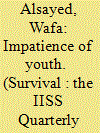

|
|
|
|
|
| Publication |
2014.
|
| Summary/Abstract |
Youth movements in the Gulf have been effective but ephemeral, sometimes manipulated by established groups or succumbing to social divisions.
In October 2012, thousands of citizens took to the streets of Kuwait City to protest an emergency decree by the emir that amended the country's electoral law in such a way as to undermine the position of the opposition within parliament. The demonstrations were unprecedented both in size and political rhetoric. An estimated 50,000 people addressed the ruler with slogans such as 'we will not let you'. Security forces used tear gas and stun grenades to break up the gatherings. Youth groups formed the backbone of the movement's leadership (at least initially) and supplied much of its rank and file. However, within months, this vibrant and defiant campaign had largely dissipated. Having failed to attain its goals, it was unable to maintain a permanent political presence. Throughout the Gulf region, other youth-led movements have suffered a similar fate. Once groups achieve their original goals or lose their initial momentum due to government resistance, they soon break down, often disappearing altogether from the political scene.
|
|
|
|
|
|
|
|
|
|
|
|
|
|
|
|
| 17 |
ID:
138610
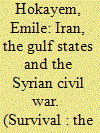

|
|
|
|
|
| Summary/Abstract |
An essential driver of the Syrian civil war has been the involvement of Iran, Saudi Arabia, Qatar and, to a lesser extent, the United Arab Emirates in every aspect of the struggle. Their role has influenced the calculations, positioning, behaviour and fortunes of the principal Syrian players. Irrespective of whether the effect was intended, this regional competition has revealed and deepened the many fault lines that cross Syrian politics and society. It has also exacerbated the polarisation of the Middle East.
|
|
|
|
|
|
|
|
|
|
|
|
|
|
|
|
| 18 |
ID:
086173
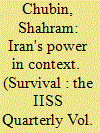

|
|
|
|
|
| Publication |
2009.
|
| Summary/Abstract |
Iran-US relations - strained at the best of times since the 1979 Iranian revolution - have never been worse than during the past six years, due to the much more intense interaction between the two states since the revelations about Iran's nuclear ambitions and the United States' invasion of Iraq. The United States sees Iran as a potential strategic rival, while Tehran views the American presence in the Middle East as a potential existential threat. This has led to zero-sum thinking and has raised the stakes correspondingly. In the process there has been an inflation of the Iranian threat, which is poorly understood and often exaggerated. Depicting Iran as a military threat obscures the real political threat the country poses to its region; Iran's regional behaviour has been neglected and overshadowed by the contentious nuclear issue. However, it is precisely Iran's behaviour and goals which feed concerns about its nuclear ambitions.
It is important to put the Iranian threat in context. In recent years, what was largely a bilateral rivalry between Iran and the United States has become displaced and expanded throughout the region: Palestine, Syria, Lebanon, Iraq and the Gulf states have all been affected by the growing tension, and there are signs that Iranian influence is becoming stronger in these areas. Iran's more active and effective diplomacy in the Middle East is due to the conjunction of three separate trends, all of which are reversible. The first is the emergence of a permissive regional environment, hospitable to Iran's diplomacy; the second, the ascension of an ideological and hardline conservative government in Tehran, predisposed to a more activist diplomacy; and third, the oil windfall, which freed resources for seeding movements and clients supportive of Iranian goals. However, the influence that has accrued to Iran as a result of these trends is transitory and precarious, and there are constraints on Iran becoming a regional superpower.
|
|
|
|
|
|
|
|
|
|
|
|
|
|
|
|
| 19 |
ID:
156087
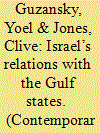

|
|
|
|
|
| Summary/Abstract |
By drawing on the literature about security regimes, this article posits the idea that a particular type of regime, which can be termed a “tacit security regime” (TSR), has begun to emerge between Israel, on the one hand, and several Gulf Arab states, on the other. It is a regime which, unlike liberal institutional variants that attempt to privilege the promotion of collective norms, remains configured around perceptions of threats to be countered and strategic interests to be realized. By examining the development, scope, and scale of this nascent TSR, this article explores the extent to which Israel, mindful of Washington, DC’s regional retrenchment, sees the emergence of such a regime as redefining the political and strategic contours of Israel’s relations with much of the Middle East.
|
|
|
|
|
|
|
|
|
|
|
|
|
|
|
|
| 20 |
ID:
027767
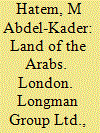

|
|
|
|
|
| Publication |
London, Longman Group Ltd., 1977.
|
| Description |
323p.Hbk
|
| Contents |
Includes index.
|
| Standard Number |
0582780373
|
|
|
|
|
|
|
|
|
|
|
|
Copies: C:1/I:0,R:0,Q:0
Circulation
| Accession# | Call# | Current Location | Status | Policy | Location |
| 017369 | 917.4927/HAT 017369 | Main | On Shelf | General | |
|
|
|
|
|
|
|
|
|